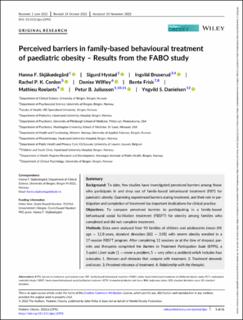| dc.contributor.author | Skjåkødegård, Hanna Flækøy | |
| dc.contributor.author | Hystad, Sigurd William | |
| dc.contributor.author | Bruserud, Ingvild Særvold | |
| dc.contributor.author | Conlon, Rachel P. K. | |
| dc.contributor.author | Wilfley, Denise | |
| dc.contributor.author | Frisk, Bente | |
| dc.contributor.author | Roelants, Mathieu | |
| dc.contributor.author | Juliusson, Pétur Benedikt | |
| dc.contributor.author | Danielsen, Yngvild Sørebø | |
| dc.date.accessioned | 2023-01-20T12:56:05Z | |
| dc.date.available | 2023-01-20T12:56:05Z | |
| dc.date.created | 2022-12-24T11:31:42Z | |
| dc.date.issued | 2022 | |
| dc.identifier.citation | Pediatric Obesity. 2022, 1-11. | en_US |
| dc.identifier.issn | 2047-6302 | |
| dc.identifier.uri | https://hdl.handle.net/11250/3044960 | |
| dc.description | This is an open access article under the terms of the Creative Commons Attribution License, which permits use, distribution and reproduction in any medium, provided the original work is properly cited. | en_US |
| dc.description.abstract | Background: To date, few studies have investigated perceived barriers among those who participate in and drop out of family-based behavioural treatment (FBT) for paediatric obesity. Examining experienced barriers during treatment, and their role in participation and completion of treatment has important implications for clinical practice.
Objectives: To compare perceived barriers to participating in a family-based behavioural social facilitation treatment (FBSFT) for obesity among families who completed and did not complete treatment.
Methods: Data were analysed from 90 families of children and adolescents (mean (M) age = 12.8 years, standard deviation (SD) = 3.05) with severe obesity enrolled in a 17-session FBSFT program. After completing 12 sessions or at the time of dropout, parents and therapists completed the Barriers to Treatment Participation Scale (BTPS), a 5-point Likert scale (1 = never a problem, 5 = very often a problem) which includes four subscales: 1. Stressors and obstacles that compete with treatment, 2. Treatment demands and issues, 3. Perceived relevance of treatment, 4. Relationship with the therapist.
Results: Families who did not complete treatment scored significantly higher on the BTPS subscales stressors and obstacles that compete with treatment (M = 2.03, SD = 0.53 vs. M = 1.70, SD = 0.42), p = 0.010 and perceived relevance of treatment (M = 2.27, SD = 0.48 vs. M = 1.80, SD = 0.50), p < 0.001 than families who completed treatment. No other significant differences between groups were observed.
Conclusion: Families are more likely to drop out of FBSFT when experiencing a high burden from life stressors or when treatment is not meeting the expectations and perceived needs of the family. | en_US |
| dc.language.iso | eng | en_US |
| dc.publisher | Wiley | en_US |
| dc.rights | Navngivelse 4.0 Internasjonal | * |
| dc.rights.uri | http://creativecommons.org/licenses/by/4.0/deed.no | * |
| dc.subject | paediatric obesity | en_US |
| dc.subject | family-based treatment | en_US |
| dc.subject | dropout | en_US |
| dc.subject | children | en_US |
| dc.subject | barriers to treatment | en_US |
| dc.subject | attrition | en_US |
| dc.subject | adolescent | en_US |
| dc.title | Perceived barriers in family-based behavioural treatment of paediatric obesity – Results from the FABO study | en_US |
| dc.type | Peer reviewed | en_US |
| dc.type | Journal article | en_US |
| dc.description.version | publishedVersion | en_US |
| dc.rights.holder | © 2022 The Authors. Pediatric Obesity published by John Wiley & Sons Ltd on behalf of World Obesity Federation | en_US |
| dc.source.pagenumber | 1-11 | en_US |
| dc.source.journal | Pediatric Obesity | en_US |
| dc.identifier.doi | 10.1111/ijpo.12992 | |
| dc.identifier.cristin | 2097322 | |
| cristin.ispublished | true | |
| cristin.fulltext | original | |
| cristin.qualitycode | 1 | |

